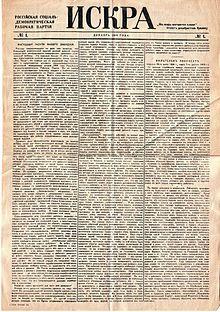| "Из искры возгорится пламя" ("From a spark a fire will flare up") | |
 The first issue of Iskra | |
| Owner(s) | Savva Morozov |
|---|---|
| Founder(s) |
|
| Staff writers |
|
| Founded | 1900 |
| Political alignment | Russian Social Democratic Labour Party |
| Language | Russian |
| Ceased publication | 1905 |
| Circulation | 8,000 |
Iskra (Russian: И́скра, IPA: [ˈiskrə], the Spark) was a political newspaper of Russian socialist emigrants established as the official organ of the Russian Social Democratic Labour Party (RSDLP).
History
Due to political repression under Tsar Nicholas II, it was necessary to publish Iskra in exile and smuggle it into Russia.[1] Initially, it was managed by Vladimir Lenin, moving as he moved. The first edition was published in Leipzig,[2] Germany, on December 1, 1900 (other sources say Dec. 11). Other editions were published in Munich (1900–1902) and Geneva from 1903. When Lenin was in London (1902–1903) the newspaper was edited from a small office at 37a Clerkenwell Green, EC1,[3] with Henry Quelch arranging the necessary printworks.[4]
Iskra quickly became the most successful underground Russian newspaper in 50 years.[5]
In 1903, following the split of the RSDLP, Lenin left the staff (after his initial proposal to reduce the editorial board to three - himself, Julius Martov and Georgi Plekhanov - was vehemently opposed),[6] the newspaper fell under the control of the Mensheviks and was published by Plekhanov until 1905. The average circulation was 8,000.
Political viewpoint
Iskra's motto was "Из искры возгорится пламя" ("From a spark a fire will flare up") — a line from the reply Alexander Odoevsky wrote to the poem by Alexander Pushkin addressed to the anti-tsar Decembrists imprisoned in Siberia. The editorial line championed the battle for political freedom as well as the cause of socialist revolution.[1] The paper also ran a number of notable polemics against "economists", who argued against political struggle in favour of pure trade-union activity for the worker's economic interests, as well as the Socialist Revolutionaries, who advocated terror tactics.[7]
As outlined by Lenin in What Is To Be Done?, Iskra took the place of a central project to cohere the RSDLP nationally.[1]
Staff
Initial staff members:
- Vladimir Lenin (Vladimir Ilyich Ulyanov)
- Dmitri Ilyich Ulyanov, his younger brother
- Georgi Plekhanov
- Vera Zasulich
- Pavel Axelrod (Pinchas Borutsch)
- Julius Martov (Ilija Cederbaum)
- Aleksandr Potresov
Later:
- Leon Trotsky (Lev Davidovich Bronstein)
Some of the staff were later involved in the Bolshevik revolution of October 1917.
Blumenfeld did the printing. Leo Deutsch was the administrator of Iskra, but did not share in the editorial work.[8]
One of the people who financed the paper was Savva Morozov.
See also
Footnotes
- ^ a b c Lih, Lars (2005). Lenin Rediscovered: What is to be Done? in Context. Brill Academic Publishers. ISBN 978-90-04-13120-0.
- ^ Helen Rappaport (2012). Conspirator: Lenin in Exile. New York: Basic Books. p. 61. ISBN 978-0-465-02859-7.
- ^ Glancey, Jonathan. G2: Architecture, The Guardian, 21 June 2004
- ^ John Saville, "Quelch, Henry [Harry] (1858–1913)", rev. Oxford Dictionary of National Biography, Oxford University Press, 2004.
- ^ Rice, Christopher (1990). Lenin: Portrait of a Professional Revolutionary. London: Cassell. ISBN 978-0-304-31814-8.
- ^ The Prophet Armed Isaac Deutscher (1957)
- ^ Miliukov, Paul (1962). Russia and its Crisis. Collier-Macmillan Ltd. p. 353–4.
- ^ Lenin and the Old Iskra; Part II in Lenin, (1925) by Leon Trotsky
Further reading
- Allan K. Wildman, "Lenin's Battle with Kustarnichestvo: The Iskra Organization in Russia," Slavic Review, vol. 23, no. 3 (Sept. 1964), pp. 479-503. In JSTOR.